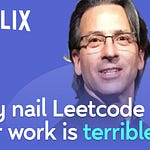Ricky went from Junior (IC3) to Staff (IC6) at Google by 28. He started there as a new grad with a total compensation of $180K, which grew to $520k within a few years.
I interviewed him to learn more since he got promoted fast even though Google is known for slower promotions.
In our conversation, Ricky said he wasn’t the best engineer but had a good blend of technical and soft skills that helped him get promoted fast. A few things I found interesting:
He wishes he grew slower - Ricky is the first person to tell me that he wishes Staff career growth opportunities came later. His increased responsibility made his work schedule much less flexible.
Saying no to projects - He turned down projects assigned by his manager if he could find something more impactful. He always presented a well-thought-out alternative.
Staying within the same team - He stayed on the same team for 6 years since he felt his management chain was supportive and he had good growth opportunities.
Imposter syndrome - He felt like a “personality hire” and was uncertain about his performance despite positive feedback. He overcame it when he learned that most Googlers also feel some and had some successful projects under his belt.
Here’s the summary of what we discussed in case you just want to see a newsletter summary but not watch the podcast:
Junior to Mid-Level Promotion (L3 to L4)
Timeline: Promoted in 1.5 years
Compensation: $180k -> $250k
Summary: This promotion was straightforward. He had a lot of imposter syndrome but forced himself to ask questions anyway despite worrying about looking “dumb.”
This is where he started to build the fundamental hard skills he needed to succeed. He focused on working independently and finishing projects without hand-holding. This is typical for this first promotion.
His soft skills were good from the beginning. He mentioned he was managing expectations with his manager and making sure what he was doing was aligned with promotion.
Mid-Level to Senior Promotion (L4 to L5)
Timeline: Promoted in 1.5 years
Compensation: $250k -> $350k
Summary: He got promoted quickly at this level because of a few key takeaways:
Took ownership of an area - One of the areas on his team didn’t have a clear owner. He became the “go-to person” for that area, which gave him opportunities to lead and have more impact.
Planning his promotion out - He found impactful projects that fit the next level’s behaviors. Part of this was learning to say no to work that wasn’t at the next level or helping him grow.
Managed up - He put together a roadmap of projects that he believed would be impactful and get him promoted. Then, he checked with his manager to get buy-in. After that, it was just a matter of execution.
Senior to Staff Promotion (L5 to L6)
Timeline: Promoted in 3 years
Compensation: $350k -> $520k
Summary: At this point, Ricky was an established leader in his org since he had stayed on the same team for years. He used this momentum to expand his influence behind his current team. He started to push the boundaries of what nearby teams were doing and challenge the status quo. This strong influence and leadership helped him have more leverage. This is what drove his promotion to the Staff level.
One interesting point here is that a lot of what he did depended on the trust and influence he had. By staying at the same company for so long, he had a much easier time with this. This contrasts the common advice to job hop all the time. As always, it depends.
Becoming a Manager
He learned quickly as a Senior engineer that he enjoyed mentoring others and seeing them grow. Becoming a manager was a natural step for him since he was already helping manage a sudden influx of 20 new hires. But transitioning so early led to some growing pains.
He shared that he felt awkward interacting with much older colleagues or running into reports outside of work. Also he mentioned that giving critical feedback and heavy meeting load were tougher than when he was an IC.
He said he wished the opportunity to become a manager came later, as it added stress in his early twenties when he felt like he should have had more flexibility.
Reflections on His Career
Imposter Syndrome:
Early on he doubted his skills and worried he was a “personality hire.”
He gained confidence after his projects succeeded.
Luck vs. Skill:
He believes his success was 50% luck (stable team, good manager) and 50% preparation (working both diligently and strategically).
He emphasized how important it is to be ready when opportunities come up.
Why he stayed at Google for so long:
He checked every 3-6 months on if he’d rather be working somewhere else.
He stayed since he enjoyed his team, found career growth opportunities, and appreciated the stability.
Advice he’d give to himself if he was a new grad again:
Trust yourself more and act on ideas sooner.
He felt he spent too much time second-guessing himself early in his career.
If you thought the above was interesting, you can hear it in more detail in the podcast format. You can listen to it wherever you prefer getting your podcasts:
For more from Ricky, you can look at his most recent “Day in the Life of a Staff Eng” video on YouTube. It sounds like one of those sensational videos flexing tech perks, but actually, it’s just about what a busy day in a more senior role at Google looks like. Worth a watch if you’re curious.
Also, you can find his socials below. Most of his content isn’t career related but he said he plans on changing that:
If you have any questions for me or future guests, feel free to drop them here. I will use these questions to make future content so I can make sure I answer questions you care about most.
Thanks for reading,
Ryan Peterman










